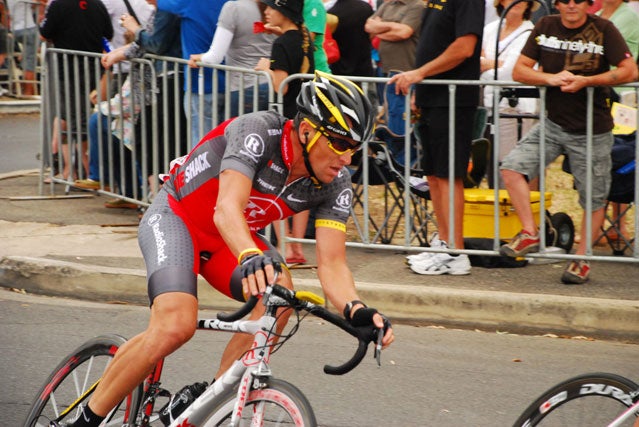Last Friday, the prominent journalist Buzz Bissinger (author of Friday Night Lights and a contributing editor to Vanity Fair) ���ڴǰ� The Daily Beast��about the latest investigation into Lance Armstrong’s alleged doping. It was called “Leave Lance Armstrong Alone.” I hate to spoil endings, but since the headline provides a slight hint, you’ll forgive me for revealing that Bissinger is fed up to his bulging eyeballs with Armstrong investigators. Too much time has elapsed since his alleged wrongdoings took place. So much time, in fact, that the actual evidence against him is no longer worth examining. At this point, we’d all be better off if we put on blinders and looked the other way.
If you think I’m being unfair, read the column. After ticking off the already familiar objections to the investigation by the U.S. Anti-Doping Agency (USADA)—��—Bissinger introduces the most ridiculous argument I’ve seen to date. We should give Armstrong a pass, he writes, because he’s a hero, and “the country has a right to at least one.” (Too many others have already been dragged down by our rabid, scandal-crazed media.) Even if there is strong evidence to prove that Armstrong cheated his way to seven Tour de France victories—and that his entire success story was built on a lie—it shouldn’t matter at this point because … well, because his backstory as a cancer survivor is so inspiring.
In the next paragraph, Bissinger trowels on the classic fallacy that we shouldn’t focus so much on A because B is worse. “If Jerry Sandusky had been pursued with the same zealotry as Armstrong,” he writes, “he would have been in prison long ago and some of his victims would have been shielded from breaking down in tragic tears this week on the witness stand.”
That is certainly true. What’s also true is that the reason people weren’t looking into Sandusky years ago is that they were too busy trying to protect another of America’s sports icons, Joe Paterno. So which is it we deserve, Buzz: justice for the alleged victims of Sandusky or eternal belief in the myth of JoePa’s Happy Valley?
I’m not surprised that people are upset that —a government-affiliated nonprofit that oversees anti-drug policies for all Olympics sports—has accused Armstrong of doping and the longtime distribution of performance-enhancing drugs. And I can understand being weary of the story, since this isn’t the first time authorities have been down this road. Most recently, the federal government spent two years methodically building a case against Armstrong, only to see it abruptly shut down by the U.S. Attorney’s office on the eve of the Super Bowl.
Armstrong fans have every right to be upset, especially if the slow drip of damning information that came out of what was supposed to be a sealed Grand Jury was indeed leaked by the FDA investigators . And I join them in feeling exhausted and burned after such an expensive, drawn-out process came to an end without any real explanation. What I can’t understand is why so many supporters feel that, no matter what the evidence is against Armstrong—and we still have no idea what the actual evidence is—it no longer matters.
It does matter. One reason sports are so widely loved is that athletic competition, in its purest form, is the last great equalizer. Everywhere else we look, the rules of society seem fixed, yielding predetermined winners and losers. Bailouts for the rich. Foreclosures for the poor. Sports are supposed to be one arena where your parents’ zip code and bank balance have no bearing on your chances of success. There’s a reason the term ��finds its way into so much of our current political rhetoric. It’s a concept we Americans love.
Doping destroys this ideal. It’s an insidious temptation that can take over entire sports—baseball, cycling, track and field—making the decision to partake that much harder to resist. Some people argue that Armstrong’s alleged cheating doesn’t matter now because the entire sport of bike racing was dirty for years. They point to all the riders who stood on the podium alongside Armstrong during his reign—Jan Ulrich, Marco Pantani, and on and on—who have since been tarnished or banned for doping. People have made this same case about the stars of baseball’s steroid era.
But, just like baseball, cycling had plenty of professional riders who never doped, and their decision to compete honestly may have determined the trajectory of their careers. Can we really say to them that it doesn’t matter if Armstrong doped? In 1976, American ��lost in the Olympic Marathon to a then-unknown East German named . Since then, it’s been well-established that East Germany ran a state-sponsored doping program, and Cierpinski has been implicated as a participant. You think, 36 years later, that this no longer matters to Shorter? What about the guy who came in fourth, ?
Nonetheless, many of Armstrong’s fans say they’re not interested in seeing the evidence, pointing to the more than 500 drug tests he’s taken and passed as proof of his innocence. Last week, former Armstrong teammate Chris Horner . “I don’t believe Armstrong has cheated in any way to win those victories and he’s gone through an insane amount of testing,” Horner told Cyclingnews. “Do we have pictures of it? Video or testing? Because without that you really don’t have anything.”
It’s true, Armstrong passed many a test, and that fact has to be taken into account. But what are we to make of the hundreds of tests also passed by riders like Ulrich and Alberto Contador and Tyler Hamilton and Floyd Landis before they were caught? The only way to believe in drug tests as the sole arbiter of guilt or innocence is to believe that none of those riders were cheating until the moment they were nabbed. Unfortunately, that’s no longer possible, since many of them already have admitted to longterm cheating.
Horner and others go a step further by implying that the absence of a positive drug test is evidence that �������ٴ�’s case is weak. Not even the potential eyewitness accounts of Armstrong’s teammates should be viewed as enough to ban him from further competition and take away his titles. But Marion Jones never failed a drug test, either. She and her fans also steadfastly stood by her innocence. Do you still believe Marion Jones raced clean?
Justice doesn’t always require a smoking gun. In the case of Jones, a mountain of evidence from federal investigators finally . In the case of Armstrong, we still don’t know if that mountain exists, but regardless of what you think of USADA or the way our tax dollars are spent or the timing of the allegations—just as Lance was training for his planned debut at October’s Ironman World Championship—you should want to know if it does.
�������ٴ�’s ��to Armstrong (and four other colleagues who are being charged) cites numerous teammates who are willing to testify against him. It may be that they simply trot out Floyd Landis and Tyler Hamilton. If that’s the case, the motivations of those two have already been so thoroughly attacked—rightly so, in some aspects—that Armstrong may have no trouble defending himself and putting this to a rest. But it’s possible that the witnesses include George Hincappie, one of Armstrong’s closest allies and one of the most respected cyclists in the peloton. Testimony such as that, if it exists, would certainly be relevant, regardless of how much time has passed.
There have been so many allegations against Armstrong over the years that it’s tempting to feel that we’ve heard it all already. But we haven’t. It’s tempting to think that the closing of the last federal investigation proves that there’s not enough evidence to settle the matter. But it doesn’t. And it’s tempting to think that, in the trial of Lance Armstrong, we the fans—and yes, I count myself among them—are the only victims. But we aren’t. There are cyclists who raced the right way despite what everyone was doing. They deserve to know the truth, one way or the other. And we deserve heroes that can stand up to the highest level of scrutiny.


